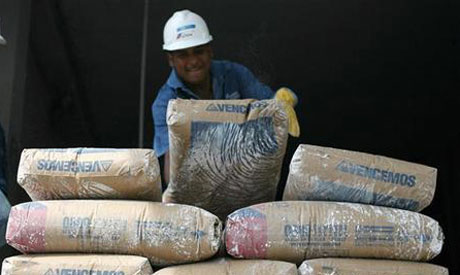
File Photo: Egypt's cement (Photo: Reuters)
After rising to a whopping LE1,250 per ton in March, cement prices retreated to LE950 per ton this month.
“The resumption of production at the Arish Cement Factory, the partial resumption of production at Sinai Cement, and the start of trial production at the Beni Sweif Cement Plant have all helped increase the supply of cement on the market, leading to the drop in prices,” said Ahmed Al-Zeini, head of the Construction Materials Division at the Cairo Chamber of Commerce.
President Abdel-Fattah Al-Sisi inaugurated a $1.12 billion cement plant in Beni Sweif established by the Armed Forces this week that is not only Egypt’s but also the region’s largest cement factory. It will have an annual production of 13 million tons on six production lines.
At present operating on a reduced basis, once the factory reaches full capacity there will be an abundance of cement on the market, Al-Zeini said.
Cement traders believe the March price hike was the result of increased demand for cement due to large real-estate projects by the Ministry of Housing and various private-sector companies.
The Construction Materials Division released a statement in March condemning the price rise. “A number of cement factories have exploited the situation in Sinai resulting in the halting of production at the Arish factory to raise the price of cement,” the statement said, calling on President Al-Sisi to speed up the inauguration of the cement plant in Beni Sweif to push down prices.
In addition to increased demand on the local market, exports of cement have also increased. According to statements by Walid Gamaleddin, chair of the Construction Materials Export Council, Egyptian cement exports saw a 49 per cent increase in 2017, reaching $94 million compared to $63 million in 2016.
Egypt is the 14th largest producer of cement in the world, producing 60 million tons annually.
In 2016, the government put 14 cement licences up for tender, with the three winning companies being Al-Masryeen in Sohag, Al-Sewidi in Ain Sokhna and Ganoub Al-Wadi in Beni Sweif.
Al-Zeini expects cement prices to drop further to LE850 per ton after the Beni Sweif factory reaches full capacity. He added that prices differed from one plant to the other and that margins of profit typically did not exceed one per cent.
“Transportation is a key factor in determining the price of cement. The further the factory is from the consumer, the higher the price.
Transporting a ton of cement from Arish costs around LE185, whereas merchants buy it from the factory at LE720,” Al-Zeini explained.
Transportation costs make up 20 per cent of the price the consumer pays, said Hassan Rateb, owner of Sinai Cement which halted production after the launch of Operation Sinai 2018 over two months ago.
Rateb, whose factory now operates at 30 per cent of capacity, said that the March increase in cement prices was the result of increased demand coupled with limited supply and the halting of production at the Sinai and Arish factories.
These two plants together produce eight million tons annually, or 15 per cent of Egypt’s total production of cement, he added.
Nasser Shanab, a member of the Construction Materials Division at the Chamber of Commerce, said that the price hikes had been the result of the absence of proper controls. Factories should be obliged to print prices on cement bags to avoid price manipulation, he concluded.
*This story was first published in Al-Ahram Weekly
Short link: